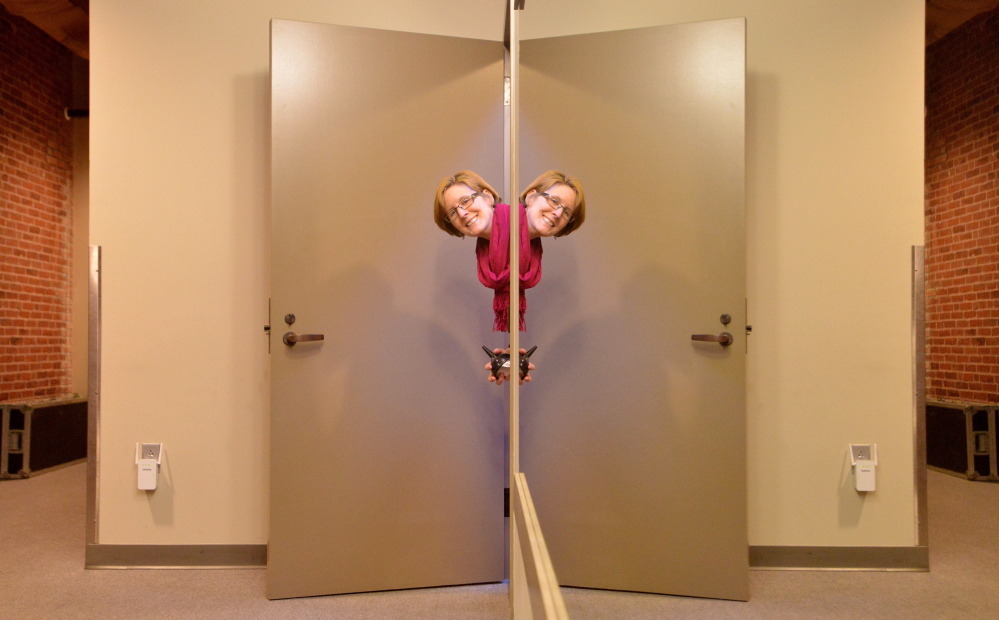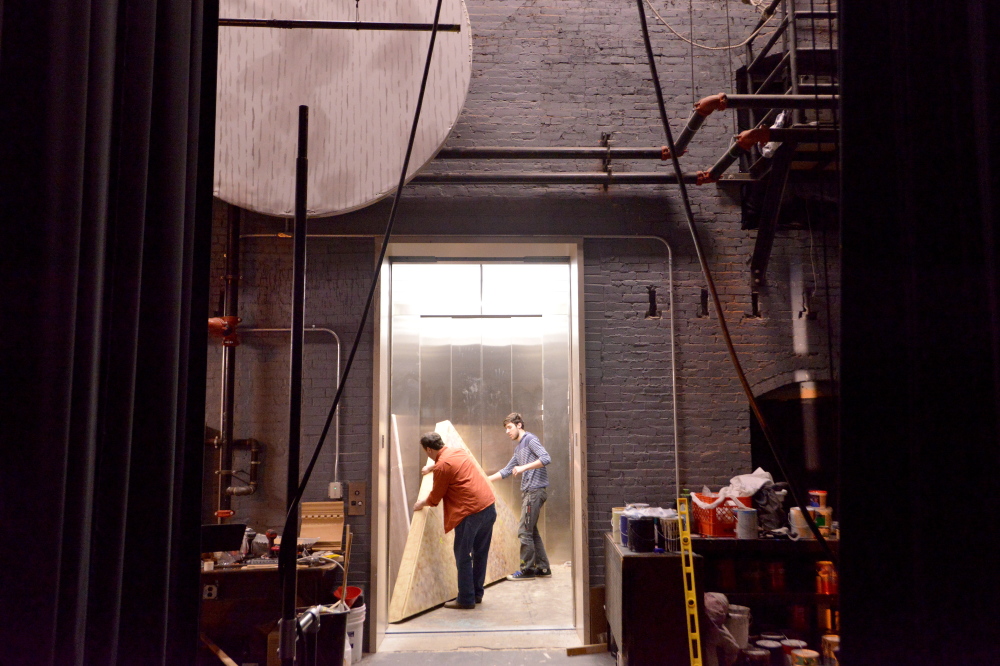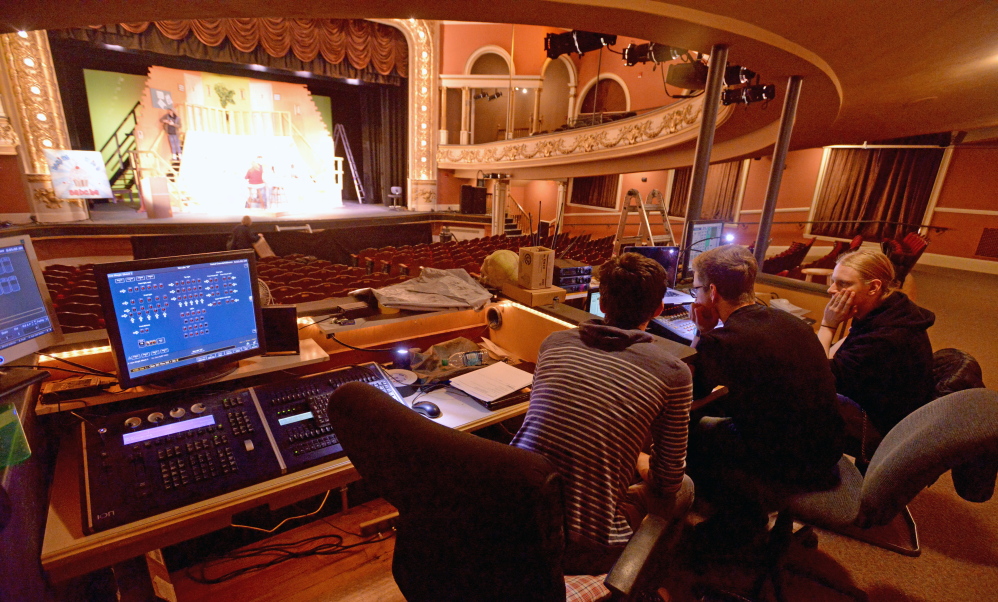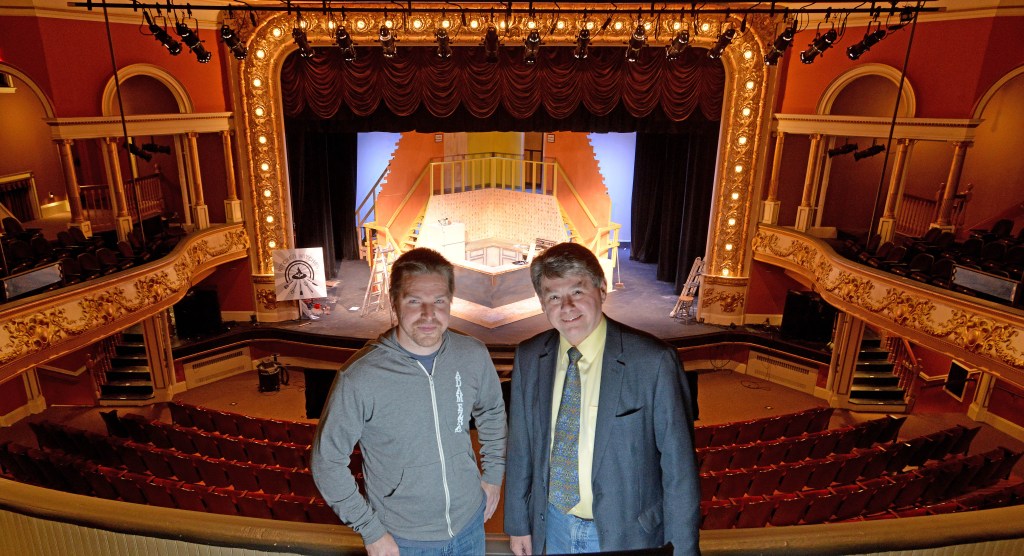WATERVILLE — When the Nitty Gritty Dirt Band played at the Waterville Opera House in October 2013, guitar, banjo and fiddle player John McEuen said the acoustics were the best he’d experienced in 47 years of live performances.
It’s been two years since the completion of a $5 million renovation project at the venerable hall that have included the improved acoustics, new balcony seating, new flooring, restored woodwork, new technical equipment, a new set shop, dressing rooms and a 2-ton freight elevator that goes directly to the stage.
The opera house now has performances every weekend and in 2014 met all of its financial obligations — breaking even, in other words — said marketing and development director Dick Dyer, 64.
“The numbers are all going in the direction we want them to,” he said. “It’s enhancing, from an artistic perspective, the quality of life; but also from an economic perspective, using a facility like this to generate an economic impact in downtown and central Maine.”
It’s not just an 800-seat concert hall for theater, dance, stand-up comedy, live music and film, Dyer said; the Waterville Opera House is also a listening room.
“The audiences have come to expect that the quality of the acoustics here. With the renovations, we took the acoustics in this hall to a B-plus,” Dyer said. “To put that in perspective, there is only one theater in New England — that’s the Wang Theater in Boston — that is higher than that acoustically.”
The key to the success of the Waterville Opera House as a listening room, Dyer said, is also listening to the community — hearing what people want to see on stage.
“What does the community want in the way of performing arts,” he said. “When I looked at who our demographic really is — who are we trying to reach — if you go half an hour from here, there’s roughly 187,000 people.
“Who is in central Maine? What’s in their interest area, whether it be the college-age crowd or the country crowd or the blues crowd or the theater crowd, we have to listen to the community and we need them to tell us. I want to hear from people what they want, not just what we think they want.”
Dyer said local people seem to love local community theater and prefer that over bringing in touring theater companies.
Before renovations were completed in February 2013, the opera house averaged about 50 audience-attended events per year. In 2014 and looking forward to this year, Dyer said that number has tripled to about 160 shows a year. Dyer added that the opera house is attracting people from out of the immediate area for shows that are high-quality and affordable.
Those shows will include eight to 12 concerts produced by former Waterville city councilor and promoter Erik Thomas in collaboration with the State Theatre in Portland. Upcoming shows are to include performances by The Charlie Daniels Band, Los Lobos and a popular entertainer whose name can not be released until Tuesday, when the national tour is announced, Thomas said.
Thomas said the musical choices for the coming year will be as eclectic as the other performances at the opera house, which include the comedic “Kitchen Witches” this coming weekend, Paula Poundstone’s return to the Waterville stage and live and encore high-definition feeds from the Metropolitan Opera in New York City.
“I have never really looked at a genre — it’s more of what agents approach us with — I have certain acts in mind for sure,” Thomas, 39, said.
Thomas in the past has booked the legendary Taj Mahal, blues men Robert Cray and Keb’ Mo’, Great Big Sea, Bela Fleck, Richard Thompson and Grammy Award-winning singer-songwriter Patty Griffin.
He said agents approach Lauren Wayne, general manager at the State Theatre and Port City Music Hall, with performance offerings; and they take it from there. They have to determine if there is a market for that particular act in the Waterville area. Thomas said the entertainment market in central Maine is strong both in the winter, when the colleges are in session; and during the summer, when visitors for New York and Boston come for their vacations.
“A lot of those summer people, they’re used to paying a lot more in New York or Boston,” he said. “The amount that an act charges also is based on the market. Somebody like Patty Griffin is going to be paid a lot more for a show in Boston than she is for a show in Waterville, but they’re going to get a more intimate show here.”
Lauren Wayne at the State Theatre said Portland is a small market compared to Boston but a larger market than Waterville. She said there is an appeal for artists to come to Waterville to perform. The occupancy at the State Theatre is 1,870 in an open floor, but with select seating, occupancy is 1,346.
“I think there are some artists that totally get that,” she said in a telephone interview. “Portland has changed so much in just five years and it’s a lot more attractive to come up here not just for the show, but to experience the city as a whole for artists.”
From there, she said, the plan is to interest those artists to make the trip to Waterville.
“I’m psyched that Erik’s up there — and that’s the only reason we’d be doing shows up there, because he knows the market, he’s a good promoter and it’s helped us to get things going up there. It’s working out really well,” Wayne said.
Wayne said from what she has seen, the Waterville Opera House is operating with a good business model, not focusing just on live music.
“I think they’re doing great. It’s a beautiful venue and it sounds great, but it’s hard to be profitable in smaller markets if you’re just doing concerts,” she said.
Dyer said in focus groups he conducts at area colleges to make students aware of the offerings at the Waterville Opera House he has found young people — some 7,000 college students live within the general area — want just as much of a diverse menu of shows as their summer counterparts do.
He said the arrangement with Thomas and Wayne at the State Theatre is good example of the kind of partnerships the opera house is trying to forge.
“Other than maybe Portland, the best market in Maine by far is Waterville,” Thomas said. “The location of the opera house in relation to the restaurants — you can come and park and go to the restaurants and walk to the show without having to get in your car again. The proximity to the highway is definitely important and the impacts on the hotels.”
He said his arrangement with the State Theatre, which reopened after renovations in 2010, is a 50-50 deal, meaning he and the Portland theater each take 50 percent of the risks and get 50 percent of the reward.
Doug Harlow — 612-2367
Twitter: @Doug_Harlow
Copy the Story LinkSend questions/comments to the editors.







Success. Please wait for the page to reload. If the page does not reload within 5 seconds, please refresh the page.
Enter your email and password to access comments.
Hi, to comment on stories you must . This profile is in addition to your subscription and website login.
Already have a commenting profile? .
Invalid username/password.
Please check your email to confirm and complete your registration.
Only subscribers are eligible to post comments. Please subscribe or login first for digital access. Here’s why.
Use the form below to reset your password. When you've submitted your account email, we will send an email with a reset code.